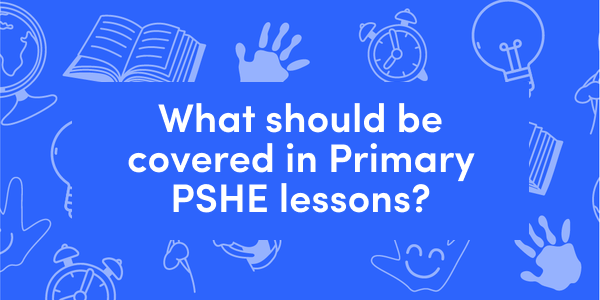What should be covered in Primary PSHE lessons?

The world in 2023 is an ever-changing, exciting and sometimes scary place and it is therefore vital that schools are preparing children to deal with the opportunities and challenges they face now and in the future. With this in mind, it is arguable that PSHE education is one of the most important subjects in the curriculum. Through a well-taught programme, children should have the opportunity to explore themselves, how they relate to others and their place in the wider world. Of course, this all needs to be taught in a safe learning environment and in an age-appropriate way to support children but not expose them to inappropriate content. In this blog post, we will consider some of the key areas that need to be covered in each primary key stage and how you decide what to cover and when, to build an effective spiral curriculum which includes knowledge, skills and attitudes.
What are the statutory requirements for PSHE in primary schools?
Since September 2021, relationships and health education have been statutory in primary schools. These include a wide range of topics that you can see in the table below.
In addition, the national curriculum sets out an expectation that all schools will make provision for PSHE education - although there is no actual programme of study.
Citizenship is also a non-statutory subject for primary schools. However, the Ofsted requirements for personal development mean teaching Citizenship in primary school is necessary. Many schools and schemes of work include Citizenship as part of PSHE and we will include this aspect as part of this blog post.
What PSHE topics should primary schools teach and when?
It is up to you as a school to plan your PSHE curriculum. You may wish to buy in a PSHE scheme of work, or of course, if you have the time, you could write your own. Whichever approach you take, you need to carefully consider the needs of your school community. The following sources of information will help you.
Local health data: Public Health England (if you’re in England) publishes a range of health data (by region and local authority). Looking at this can help schools identify if there are specific issues they need to address in their area. Data sets you might find useful include; obesity, life expectancy, under 16 conceptions rates, smoking rates and physical activity.
Local support services: school nurses, police and the fire service can provide insight into the issues that affect your local area. Talk to them about what your children might be experiencing and also what is happening with older children and adults locally.
School intelligence: staff in school will of course have a good understanding of the issues children face. Involve as many staff as possible in these discussions as non-teaching staff might have an insight into what issues are affecting the community. Talking to other local schools, including secondary schools, can also be useful.
Pupil voice: talking to the children themselves is vital when assessing their needs. We often make assumptions about what children know about and are experiencing and we might miss certain things. Carrying out surveys or pupil interviews can provide a deeper understanding of what children need to learn about.
Once this information has been collated you need to consider what topics you want to include and when. The following information describes in a bit more detail the considerations you need to consider for each age group, and then there are some examples of how a spiral curriculum might work for certain topics.
What should be covered in PSHE for EYFS?
Learning for children in the early years foundation stage is set out in the early years framework. This includes personal, social and emotional development and therefore PSHE is not necessarily taught as it would be in key stages 1 and 2. Having said that, schools sometimes wish to introduce topics in a similar way across age groups, so topic headings may reflect what is happening in the rest of the school. By the end of reception, teachers may wish to teach PSHE lessons in a similar way to key stage 1 for the sake of continuity.
What should be covered in PSHE for Key Stage 1?
During key stage 1 most of the content from the statutory guidance should be introduced in an age-appropriate way. The majority of children’s understanding will be limited to their own experience and what happens in their family and to their friends. However, carefully planned activities should begin to introduce them to the concept that their experiences and opinions may be different from their peers, that this is okay and how to be respectful of these differences.
What should be covered in PSHE for lower Key Stage 2?
During this time children will be exposed to a greater range of influences and experiences. Lessons should help them to consider these and begin to make their own decisions and choices on what is right for them. The topics from the statutory guidance should be addressed again, building on the knowledge from key stage 1. Alongside knowledge, it is also important to develop skills and attitudes.
What should be covered in PSHE for upper Key Stage 2?
At this stage, children will be exposed to a wide range of information and influences beyond their immediate experience. It is important to be realistic about these and to ensure lessons help children to navigate topics and know where they can seek help. Skills and attitudes need to be developed alongside knowledge.
How can we ensure of progression of skills and knowledge in PSHE?
Below are some examples of a spiral approach to PSHE topics.
Relationships
|
Pupils should know that others’ families, either in school or in the wider world, sometimes look different from their family, but they should respect those differences and know that other children’s families are characterised by love and care for them |
|
|
Foundation stage |
|
|
Key stage 1 |
|
|
Lower key stage 2 |
|
|
Upper key stage 2 |
|
Health education
|
Pupils should know the facts about legal and illegal harmful substances and associated risks, including smoking, alcohol use and drug-taking |
|
|
Foundation stage |
|
|
Key stage 1 |
|
|
Lower key stage 2 |
|
|
Upper key stage 2 |
|
Non-statutory topic
|
Road safety |
|
|
Foundation stage |
|
|
Key stage 1 |
|
|
Lower key stage 2 |
|
|
Upper key stage 2 |
|
Want to save time on PSHE planning and ensure full curriculum coverage?



